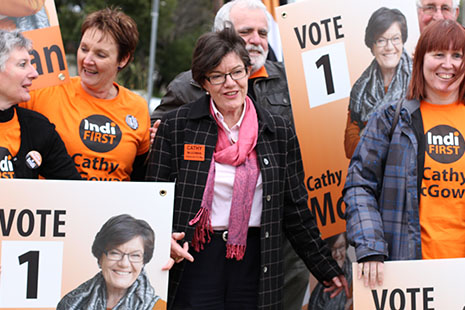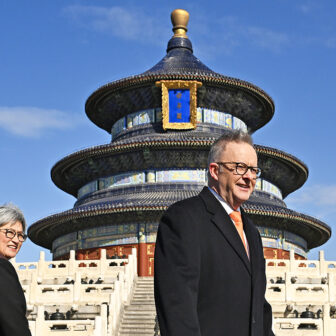IF YOU head north out of Melbourne and drive for about forty minutes you’ll cross the Great Dividing Range and pass into Indi. This sprawling electorate covers some 28,000 square kilometres – roughly the same area as the US state of Massachusetts. It is a primarily rural region of mountains, rivers, valleys and plains. Within its borders are the Mitta Mitta River, the King River and the Kiewa River – the major catchments of the Murray River – along with all the major Victorian ski resorts and some of the most picturesque national parks in the country. The major urban centres of Wodonga, Wangaratta and Benalla service large areas of agricultural land, the snowfields and forest-based tourism.
Since it was created at Federation, Indi has almost invariably given conservative MPs some of the most comfortable margins in the land. The only time it has been held by another party was during a short period from 1928, after the conservative candidate forgot to nominate. In recent times it has been held by the Liberal member, Sophie Mirabella, who took over from the retiring member, Lou Lieberman, in 2001. Since peaking in 2004 at 63 per cent, Mirabella’s primary vote has been in decline; she retained the seat with 52.6 per cent in 2010.
Like many people around Australia, a group of Indi locals watched the past three years of politics – one of the ugliest and most negative in the country’s history – in despair. Feeling alienated from what they saw in Canberra, and from their own MP’s part in it, they began meeting quietly at the Wangaratta Library. So constrained was political discourse in the area – and so strong was Sophie Mirabella’s grip on the seat – that these meetings began with a distinctly clandestine edge, for fear of retribution in participants’ professional or personal lives. This motley group of various political colours became Voice for Indi, and their goal was to begin a conversation that had not been taking place in Indi for a very long time – a conversation about needs, values and political leadership.
Voice for Indi recognised the power of the community networks in rural politics and set out to harness this social capital. During April and May of this year, using the Victorian Women’s Trust “kitchen table conversations” model, they held fifty-five structured, facilitated conversations involving 425 people across the vast electorate.
The main themes that emerged from the conversations were compiled into a report. Prolonged debate ensued about how to bring the issues raised in the report to the fore. When a plan to harness Voice for Indi’s momentum by putting forward an independent candidate became the leading option, the committee began headhunting prominent locals to run. While there was wide support for the idea, many people expressed anxiety about taking on the vast party machine Sophie Mirabella had behind her. Given the sitting member’s aggressive style, it was felt that personal and professional reputations would be treated as fair game.
Although she resisted for several months, Cathy McGowan – Voice for Indi’s chair at the time – was eventually persuaded to throw her hat in the ring as the list of potential candidates was refined. Each candidate went through an application process and was measured against key selection criteria established by Voice for Indi.
THEN began what is, by any measure, the largest political mobilisation ever seen in this part of Australia. Up against the might of the Liberal Party machine, Voice for Indi was always going to be outspent. But as the race tightened, the Liberal Party was forced to divert funds from other target seats and into Indi, with some estimates putting Mirabella’s campaign expenditure at up to half a million dollars.
Social media played an integral role in the success of the campaign. At workshops across the electorate volunteers were taught how to use Facebook and Twitter as a campaign tool. Groups of volunteers coordinated meetings, actions and rallies. An initial investment in targeted Facebook advertising ensured that the campaign’s Facebook audience was local and could be used to mobilise on-the-ground support. In line with a nationwide Liberal edict to limit exposure on social media, Sophie Mirabella tweeted just three times during the campaign. We capitalised on this vacuum and ensured our online presence was open, friendly and accessible.
Twitter was used differently. It has less penetration regionally than Facebook, and with its generally acknowledged slightly left bent it worked best as a key tool for fundraising outside the electorate. With 3400 followers at the time of writing, it also became highly effective as a way of keeping supporters up-to-date with the latest news and, indeed, as a first point of contact for many mainstream media reporters. On election night, the hashtag #indivotes, which had been used locally throughout the whole campaign, was trending nationally.
In online donations alone, the campaign raised over $117,000. The only other independent candidate to have raised a similar figure was Tony Windsor in his final campaign. Unlike Windsor, for whom the bulk of funds were raised from several large donors, over 1000 people donated to Cathy McGowan’s campaign – an average of about $130 per person. A crowdfunding campaign was pushed heavily on Twitter and Facebook, allowing many interested people outside the electorate, to help out.
Central to our social media strategy was targeting and fostering relationships with “online influencers.” Well-known Twitter supporters, including playwright and columnist Van Badham, former PM Malcolm Fraser and Indi-expat Corinne Grant shared our fundraising efforts with their followers and the strategy snowballed from there.
Underpinning our online and on-the-ground effort was the cutting-edge software package Nationbuilder. This American cloud-based platform allowed us not only to manage our web content but also to maintain logs of interactions with our 600 volunteers, 1000 donors and 5000 online supporters. Countering the common argument that “clicktivism” fails to translate into on-the-ground support, we were able to measure and map as our online supporters became donors and volunteers and attended events. Through Nationbuilder we were able to constantly track our areas of support and target areas where we were weak across the electorate, empower volunteers to host their own events and tailor relevant communications using a huge number of variables. The same software has been used in many US House, Senate and gubernatorial races, and most recently in Australia by Adam Bandt’s successful re-election campaign in Melbourne.
A flat organisational structure was characteristic of the generally DIY nature of the campaign. Once volunteers came aboard, they were inducted through dozens of briefing sessions and asked to sign a values contract emphasising, among other things, the need to remain respectful of opponents. Volunteers were then given full autonomy and responsibility for activating their part of the electorate.
In Yackandandah, volunteers organised a fundraising bushdance, and more than 200 people in a town of just over 600 turned out to support Cathy. Singing circles, with orange-clad supporters performing a slightly altered version of Paul Kelly and Kev Carmody’s From Little Things Big Things Grow, sprang up all over the northeast, as well as movie nights, cash mobs and protest rallies.
Indi has never seen anything like this before. For the first time in living memory thousands of people from all walks of life were engaging in politics and having a say in how they would like to see their electorate represented. For too long they had been taken for granted. Labor knew it couldn’t win it, so it hadn’t ever bothered trying; the Liberals knew they were going to win, so they didn’t bother either.
Out of that complacency, and spurred on by disenchantment with the representation provided by the sitting member, Cathy McGowan offered the people of Indi a genuine and fresh alternative. Though the result may not be known for a few days yet, Indi has already won.
While the rest of Australia switched off at this election, we switched on. We are now an engaged electorate. The people of Indi are claiming the power to be the architects and authors of our community’s future. Whoever is elected as the Member for Indi will have a strong, engaged, opinionated community to answer to and that is a win for any democracy. •




